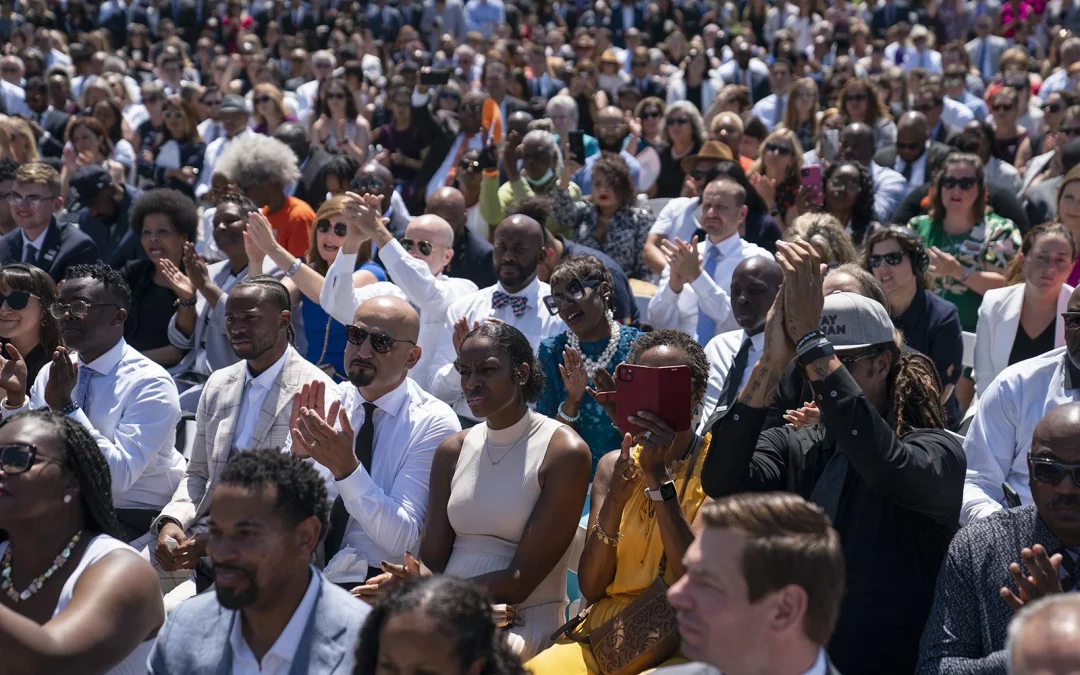
by Adelle M. Banks and Jack Jenkins, RNS | Jul 12, 2022 | Headline News, Social Justice |
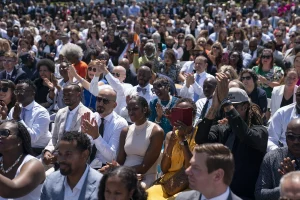
(RNS) — Faith leaders from a wide range of traditions, including those whose houses of worship have been attacked, were at the White House Monday (July 11) as members of Congress and other gun control advocates gathered for a White House celebration of the Bipartisan Safer Communities Act, signed into law June 25.
Pastor Mike McBride, the leader of Live Free USA, who has long sought political support to especially help the nation’s urban centers, hailed the signing as an opportunity to address gun violence deaths that do not always make national headlines.
“It’s been a very difficult task to get the death of Black men in this country, much less the death of any Black folks, to receive national attention and intervention,” said McBride. “Even among Democrats — Democrats have not been the most political champions for this work. So it’s taken us 10 years to get to $250 million committed in a bipartisan way.”
On hand were Rabbi Jonathan Perlman and others who endured a mass shooting in 2018 at the Tree of Life Synagogue in Pittsburgh and the Rev. Sharon Risher, whose mother was among the nine African American worshippers killed during the 2015 shooting at Mother Emanuel AME church in Charleston, South Carolina.
“That was beautiful — to see all these heroic people, survivors that have been working for change,” said Shane Claiborne, co-founder of the group Red Letter Christians and leader of an effort that melts down guns into garden tools in observance of the biblical call to turn “swords into plowshares.”
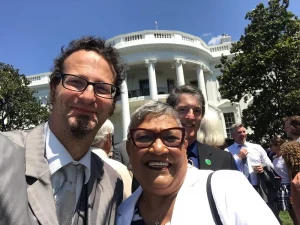 But Claiborne added that he understood that the bipartisan legislation “is the most substantial gun reform bill that we’ve seen in 30 years. But what we also heard is how dysfunctional our political process is — because there’s so much more that’s needed.”
But Claiborne added that he understood that the bipartisan legislation “is the most substantial gun reform bill that we’ve seen in 30 years. But what we also heard is how dysfunctional our political process is — because there’s so much more that’s needed.”
“We need a ban on assault rifles,” he added.
The legislation includes a variety of interventions into gun purchasing, including expansion of background checks for people younger than 21, $250 million for community-based violence prevention initiatives and $500 million to increase the number of mental health staffers in school districts.
President Joe Biden, in remarks from the White House’s South Lawn, decried the violence that has turned houses of worship, schools, nightclubs and stores into places of death.
“Neighborhoods and streets have been turned into killing fields as well,” said the president. “Will we match thoughts and prayers with action? I say yes. And that’s what we’re doing here today.”
Claiborne said he presented a Christian cross made from a melted-down gun barrel to second gentleman Douglas Emhoff, as well as to a friend of President Biden.
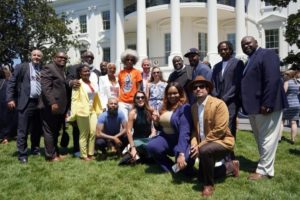 McBride said his efforts with faith leaders on this issue date back to a 2013 meeting at the Obama White House, when Biden was vice president.
McBride said his efforts with faith leaders on this issue date back to a 2013 meeting at the Obama White House, when Biden was vice president.
“In 2013, we asked for $300 million, and we were told no,” he recalled. “And so some 10 years later, we’ve gotten close to that original ask.”
He said the programs for which groups like the Fund Peace Foundation seek support are “targeted for Black and brown communities that are dealing with the highest rates of gun violence,” including from gangs and intimate partners.
Other faith groups have responded to the passage of the legislation with statements of support.
“The investments in mental health services and reasonable measures to regulate guns included in this bill are positive initial steps towards confronting a culture of violence,” said Archbishop Paul S. Coakley of Oklahoma City, chairman of the U.S. Conference of Catholic Bishops’ Committee on Domestic Justice and Human Development.
“We are heartened that after almost three decades of gridlock, Congress has finally taken bipartisan action to address America’s gun violence epidemic and end violent crime,” said Melanie Roth Gorelick, senior vice president of the Jewish Council for Public Affairs. “This is a huge victory, but we cannot allow this to be the end.”
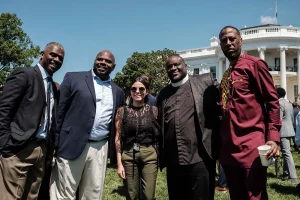 While calling himself grateful for this historic development, McBride said he and his partners will be pushing for far more support.
While calling himself grateful for this historic development, McBride said he and his partners will be pushing for far more support.
“This will be a failure if this is the only thing they do for the next few years,” he said.
Biden seemed to agree that further action was needed.
“We have so much more work to do,” he concluded. “May God bless all of us with the strength to finish the work left undone, and on behalf of the lives we’ve lost and the lives we can save, may God bless you all.”
by Christine A. Scheller | Sep 9, 2011 | Feature, Headline News |

The Cross at Ground Zero.
Sunday marks the tenth anniversary of the September 11, 2001 terrorist attacks on the World Trade Center, the Pentagon, and Flight 93, so we asked three urban leaders who will be participating in memorial events how the attacks impacted urban ministry.
Here’s what they said:
 Jeremy Del Rio, Esq., New York
Jeremy Del Rio, Esq., New York
Jeremy Del Rio is executive director of Community Solutions, Inc. a faith based youth and community development agency in New York City. On September 10, Del Rio will participate in Reaching Out, A Sacred Assembly, a prayer and worship service in New York City.
September 11, 2001 exposed gaps in urban ministry in ways that could not be ignored any longer. The church’s response to those gaps demonstrated grace and hope and provided a glimpse of what might be one day. For me, here are three lessons learned over the last decade:
1) The magnitude of the attack and the scope of its impact required a Jesus who was far bigger than any one ministry or personality to heal. It forced the Church to confront the sad reality that we were too disconnected from each other to be a useful partner to our city during a crisis. It’s impossible to mobilize 7,000 churches quickly when they aren’t already connected and coordinated, so the city didn’t call us initially for help. Pastors and church leaders had to repent for being lone rangers and intentionally link arms during the common crisis in order to respond effectively and be Christ to a city that was collectively grieving in unprecedented ways.
2) September 11 also exposed fear and bigotry among many Christians towards our Muslim cousins. Suddenly, many who professed a love for Christ and people were parroting suspicions about our immigrant neighbors and perceiving threats where none existed. The Church had to embrace that Jesus’ imperative to love our neighbors as ourselves includes those individuals and communities we might otherwise fear, and wrestle with how to build bridges during and beyond the crisis.
3) The inertia of normalcy has obscured the need to remain vigilant in nurturing the kind of relationships that build trust across denominations and congregations, and with neighbors regardless of their faith and cultural traditions. My prayer for the Church on this tenth anniversary is that we would recapture what it means to love each other in such a way that the world will know we are His disciples.
To read more about how Jeremy and his father Rev. Richard Del Rio ministered in lower Manhattan post-9/11, go here.
 Rev. Dr. DeForest Soaries, Somerset, New Jersey
Rev. Dr. DeForest Soaries, Somerset, New Jersey
DeForest “Buster” Soaries is senior pastor of First Baptist Church of Lincoln Gardens in Somerset, New Jersey, and a pioneer of faith-based community development who has also served as New Jersey Secretary of State and chairman of the United States Election Assistance Commission. On September 11, Rev. Soaries will speak at the September 11th Remembrance Service in Ocean Grove, New Jersey.
I’m not sure the impact was greater in urban areas or not. The short term impact was to motivate people to think more about God, faith, and church. But long term, we have seen a return to a preoccupation with materialism versus a focus on God. The major ministry need that I’ve experienced and seen around the country is a greater need for focus on mental health ministry. We’ve added a full time therapist to our staff.
Black America has historically been the most optimistic and today all of the data describe African Americans as being more optimistic than the general population on the one hand. On the other hand, in terms of concrete expectations, we’re finding that there’s a greater sense of hopelessness and despair. The way that’s related to 9/11 is that prior to 9/11 our culture perceived itself as being almost invulnerable. What 9/11 did was begin a process of perceived vulnerability. After 10 years of being constantly reminded how vulnerable we are, it has begun to affect us emotionally and psychologically. The church has to create the connection for people between our emotional, psychological, and spiritual status.
While 9/11 was a terrorist attack, we’ve also been victims of a global economic meltdown and I would argue that our sense of helplessness in response to the economic meltdown is directly related to the decline in our sense of national self confidence. Prior to 9/11 we had this sense of “we can make it if we try.” In post-9/11 America, we have a sense of “there’s no way out.”
The economic crisis that we’re experiencing is probably more difficult to climb out of emotionally, psychologically, and spiritually then it perhaps would have been before 9/11. In 1987 we had a tremendous stock crash, but the general sense of the country was “we can make it through this.” Then in 2001, we had another traumatic decline in the stock market, but now what we’re finding is that the kind of optimism that would normally accompany economic decline seems to be accompanied by a general sense of pessimistic projection. I think 9/11 was the singular date when we began to question our ability to really manage our circumstances. The challenge of the church is to make the case that our psychological, emotional, and therefore poltical status, hinges on our spiritual strength.
 Shane Claiborne, Philadelphia
Shane Claiborne, Philadelphia
Shane Claiborne is co-founder of The Simple Way community in Philadelphia, a best-selling author, and a social justice/peace activist. On September 10, he will co-host Jesus, Bombs, & Ice Cream, a 90 minute variety show, with Ben & Jerry’s Ice Cream co-founder Ben Cohen in Philadelphia.
My initial thoughts about the impact of 9/11 on urban ministry relate to the increases in military spending where we’re spending like $250,000 a minute. As the country goes bankrupt, it raises all kinds of questions. In our neighborhood, we can really see what Dr. King meant when he said, “Every time a bomb goes off overseas, we can feel the second impact of it right here.” We’ve got thousands and thousands of abandoned houses, a bankrupt school system, folks needing healthcare. The interconnectedness of that is really evident.
In addition, I think that what one veteran from Iraq called the “economic draft” has become a really urgent reality for our kids in the urban neighborhood here, where they’re selectively recruited. The fliers that they give out say, “Everybody told you to go to college. They just didn’t tell you how to get there. Join the Army.”
We have a drop out rate over 40 percent in Philadelphia. At a graduation I attended this year, they said more kids will be going into the military than will be going to college. That really struck me. The post-September 11 military ethos has grown and affected things dramatically.
This year we’ve got a mentoring program called Team Timotheo, where young men are mentored and discipled by older men. It’s a football league that was started by guys in our neighborhood. Part of what we’re trying to do is to teach young people non-violence and out of it, deeply rooted faith in Jesus and the non-violence of the cross. We’ve got a homicide rate that is almost one a day in Philadelphia right now. All of that is very interconnected because we’re trying to teach kids not to hit each other and then they see this mess of redemptive violence kind of perpetuated all over the world after September 11.
There’s a kind of spiritual dimension to it. There’s an economic dimension to it. So those are all things that we’ll be talking about on Saturday. Particularly the testimony of the Iraq veteran, Logan. He’ll be sharing about his collision with the cross and the gun. Terry Rockefeller, whose sister was killed on 9/11, has said there was never a moment when she thought violence would be the answer or would solve the tragedy of September 11. Those are credible, important voices. We planned Jesus, Bombs, and Ice Cream before we realized it was the tenth anniversary of 9/11, but then when we realized it was, we decided that there’s no better way to honor those who died on September 11 and those who are continuing to die now than to try to celebrate the possibilities of another, better world.
*DeForest Soaries’ and Shane Claiborne’s comments were edited for length and clarity. Jeremy DelRio submitted his via email and those were not edited.


 But Claiborne added that he understood that the bipartisan legislation “is the most substantial gun reform bill that we’ve seen in 30 years. But what we also heard is how dysfunctional our political process is — because there’s so much more that’s needed.”
But Claiborne added that he understood that the bipartisan legislation “is the most substantial gun reform bill that we’ve seen in 30 years. But what we also heard is how dysfunctional our political process is — because there’s so much more that’s needed.” McBride said his efforts with faith leaders on this issue date back to a 2013 meeting at the Obama White House, when Biden was vice president.
McBride said his efforts with faith leaders on this issue date back to a 2013 meeting at the Obama White House, when Biden was vice president. While calling himself grateful for this historic development, McBride said he and his partners will be pushing for far more support.
While calling himself grateful for this historic development, McBride said he and his partners will be pushing for far more support.

 Jeremy Del Rio, Esq., New York
Jeremy Del Rio, Esq., New York Rev. Dr. DeForest Soaries, Somerset, New Jersey
Rev. Dr. DeForest Soaries, Somerset, New Jersey Shane Claiborne, Philadelphia
Shane Claiborne, Philadelphia